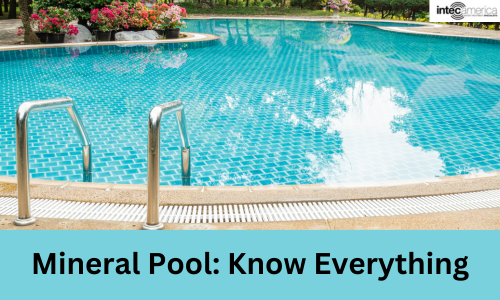If there’s one thing most people don’t like about their private pool, or even visiting the public pool, it’s probably the overwhelming chlorine smell in the air, on your swimsuit, and in your hair.
Fortunately, chlorine isn’t the only way to get and maintain a sanitized and safe pool. Mineral sanitized pools offer safety and clean water, while also cutting the irritation and intense scent of chlorine.
Of course, like any pool system, there are pros and cons to using a mineral sanitation system. It’s worth weighing the pros and cons, as well as the potential differences in water quality, scent, and feel when you’re deciding if mineral pool sanitation is right for you.
Key Points:
- How mineral pool sanitation works
- What makes mineral pool sanitation systems so effective
- Pros and cons of mineral pool sanitation
- Use of chlorine or other pool chemicals in a mineral pool
And more!

What Is A Mineral Pool?
Mineral pools take advantage of the natural sanitization from copper. In fact, this kind of sanitization of water has been around for a long time, though it’s effectiveness isn’t as well known as other methods like chlorine and bromine.
Mineral pools significantly reduce your chlorine requirements by taking care of most of the contaminants through natural processes that happen when cells are exposed to minerals. Unlike chlorine, this process isn’t irritating for your skin or hair, and can also help improve water feeling and texture over classic chlorine pools.
However, since the mineral sanitizing action is a little slower than chlorine, chlorine or an anti-algae chlorine alternative are required to help control algal blooms.
Since the concentration of chlorine is significantly lower, however, eye, skin, and hair irritation are also lower. Mineral pools can also effectively manage chlorine concentrations with the use of chlorine tablets, minimizing how often you have to deal with chlorine granules.
Are Mineral Pool Systems Safe?
Yes! Mineral pools are a perfectly safe alternative to chlorine for pool sanitization. Of course, that doesn’t mean that mineral pools are maintenance free. It’s still important to check the levels of the minerals in your pool, to replace mineral cartridges regularly, and even occasionally to shock your pool to take care of algae or other contaminants.
Most mineral pools do require some use of chlorine or bromine, but at significantly lower concentrations than are otherwise required. However, some mineral pools, like pools using copper ionization, can make it safe and effective for you to have a completely chlorine free pool!
There are also a lot of options when it comes to mineral pool systems, from floating systems to inline sanitization that can be added to your existing filtration system.
Pros And Cons Of Mineral Pool Sanitation Systems
Here are some of the key features of mineral pool systems that you should consider before you commit to a mineral pool.
Pros:
- More Natural Option:
Sanitizing water with copper takes advantage of natural processes, and ones that humans have used for centuries to keep water safe to drink and bathe in. - Less Unpleasant Scent:
One of the biggest downsides of going to a pool or installing one in your backyard is the scent of chlorine that often comes with the pool. Mineral pools greatly reduce that scent. - Long Lasting Cartridges Cut Down On Maintenance:
Pool owners often underestimate the maintenance requirements of owning a pool when they get one installed. That can lead to unexpected expenses when your pool needs more maintenance, or when you need to deal with problems resulting from poor maintenance habits. Mineral pools reduce this problem thanks to cartridges that last longer and require less intervention. Of course, you still need to monitor the levels of each mineral in your pool. But using dispensers even for the other chemicals in the pool can further decrease your day-to-day maintenance requirements.
Cons:
- Maintenance Problems Can Rapidly Increase Costs:
One of the draws for a lot of people considering mineral pools is the opportunity to reduce the maintenance cost of their pool. However, needing to replace the water in your pool if you let the minerals build up too much, mineral staining, and the need to occasionally shock your pool can all add to the costs. These events can also be less predictable than the maintenance costs for chlorine pools, which means they are harder to anticipate and budget for. - Oxidation and Oxidation Staining Risks:
Because of the copper in mineral systems, there is also a risk that oxidation of the copper will turn your pool water, and the liner of your pool, a bright green.
Are Mineral Pools A Good Investment?
Overall, mineral pools have a lot of advantages, and they can be the right pool maintenance option for a lot of people. However, it’s worth thinking about the key differences between mineral pools and chlorine pools in terms of maintenance requirements, the potential costs associated with mineral pools, and what kind of problems are going to be easier or harder for you to deal with.
Mineral pools are comfortable, can cut maintenance requirements, and are often more pleasant for swimmers.
If you think a mineral pool is the right option for you, contact Intec America to request a quote for your project.
Recent Blog Posts
- Arsenic Water Contamination: Symptoms, Testing, and Treatment
- How To Remove Hard Water Stains
- Long Term Water Storage System – Guidelines and Treatments Explained
- Pool Chemicals and Their Potential Side Effects
- How To Read A Water Quality Report?
- Cloudy Pool Water Causes and Solutions
- Guide to Eradicate Legionella and Other Water-Borne Bacteria from Your Pool
- Everything You Need to Know About Distilled Water
- Well Water Contamination: Causes, Symptoms and Treatment
- Guide to make rainwater potable
- Know Everything About Rainwater Harvesting
- Microplastics in Drinking Water: Causes and Prevention Overview
- Mercury in Drinking Water – Causes, Effects, and Prevention Explained


